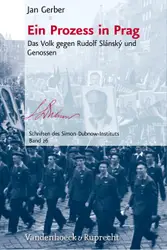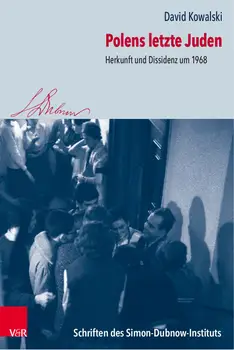Warsaw, 1968. Students are protesting against the Polish state and party leadership. They are not advocating the abolition of Socialism, but rather the fulfillment of its promises. Many of the young protestors, including Irena Grudzińska, Adam Michnik, and Jan T. Gross, come from Jewish families. However, only a few of them identify with Judaism, seeing themselves rather as Polish patriots and as Communists. Nevertheless, their origins are implicitly evoked in their protests. David Kowalski's study examines the meaning of this belonging in the early opposition movement. Reaching back to the interwar period, he illuminates the experiences of the generation preceding the dissidents of 1968, examines the repercussions of the Holocaust, and demonstrates the interconnections of origins, Communist hopes, and Socialist disappointments.

Herkunft und Textkultur : Über jüdische Erfahrungswelten in romanischen Literaturen 1499–1627
Susanne Zepp
book
Die Kritische Theorie in Amerika : Das Nachleben einer Tradition
Robert Zwarg
book
Ein Prozess in Prag : Das Volk gegen Rudolf Slánský und Genossen
Jan Gerber
book
Kaufmanns Nachrichtendienst : Ein jüdisches Gelehrtennetzwerk im 19. Jahrhundert
Mirjam Thulin
book
Polens letzte Juden : Herkunft und Dissidenz um 1968
David Kowalski
book
Joseph Wulf : Ein Historikerschicksal in Deutschland
Klaus Kempter
book
Matzpen : Eine andere israelische Geschichte
Lutz Fiedler
book
Haskala und Lebenswelt : Herz Homberg und die jüdischen deutschen Schulen in Galizien 1782–1806
Dirk Sadowski
book
Missratene Söhne : Anarchismus und Sprachkritik im Fin de Siècle
Carolin Kosuch
book
Arsenale jüdischen Wissens : Zur Entstehungsgeschichte der »Encyclopaedia Judaica«
Arndt Engelhardt
book
Psychoanalyse: interdisziplinär – international – intergenerationell : Zum 50-jährigen Bestehen des Sigmund-Freud-Instituts
book
»Gute Psychotherapie« : Verhaltenstherapie und Psychoanalyse im soziokulturellen Kontext
Judith Lebiger-Vogel
book
